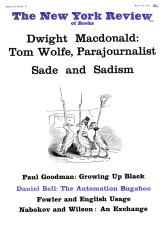In response to:
The Strange Case of Pushkin and Nabokov from the July 15, 1965 issue
To the Editors:
Vladimir Nabokov is a Russian whose knowledge of the English language is almost perfect but not good enough to translate Pushkin. However, Edmund Wilson’s erudite review of Nabokov’s erudite translation of Eugene Onegin only proves that Wilson’s knowledge of the Russian language is, alas, only fair.
Of course, Nabokov is right when he writes that the word nietu is “an old-fashioned and dialect form” of niet. Is it possible that the clerks in the Soviet bookstore in New York also speak Anglo-Russian or American-Russian?
For Mr. Wilson’s information the Bessarabian city of Kishinev is actually pronounced Kishinev and not, as Wilson claims, Kishinyov. But he is right in insisting that Mogilyov should be spelled with yo and not Mogilev.
I agree with Mr. Wilson that there can be “no really simple way of transporting” the Russian alphabet into English. Why, then, does he object to the American spelling of Khrushchev’s name as Khrushchev and not Khrushchyov? Since the ex-Kremlin leader is a native of the Ukraine it is possible that, until he came to Moscow, his name was always pronounced Krushchev. Or is Mr. Wilson a pure Muscovite and a Great Russian imperialist? Etc, etc….
Anyway, what has all this to do with Mr. Nabokov’s translation of Eugene Onegin, which, unfortunately, does little justice to Pushkin? According to tradition, Pushkin had a great sense of humor and he loved to write pornographic poems. (I can still recite some of them.) How he would have laughed at pundits like Nabokov and Wilson!
Only those who know Russian can really enjoy Evgeni Onegin. Otherwise, Professor Walter Arndt’s translation is still the best of the lot.
Leon Dennen
New York City
This Issue
August 26, 1965



